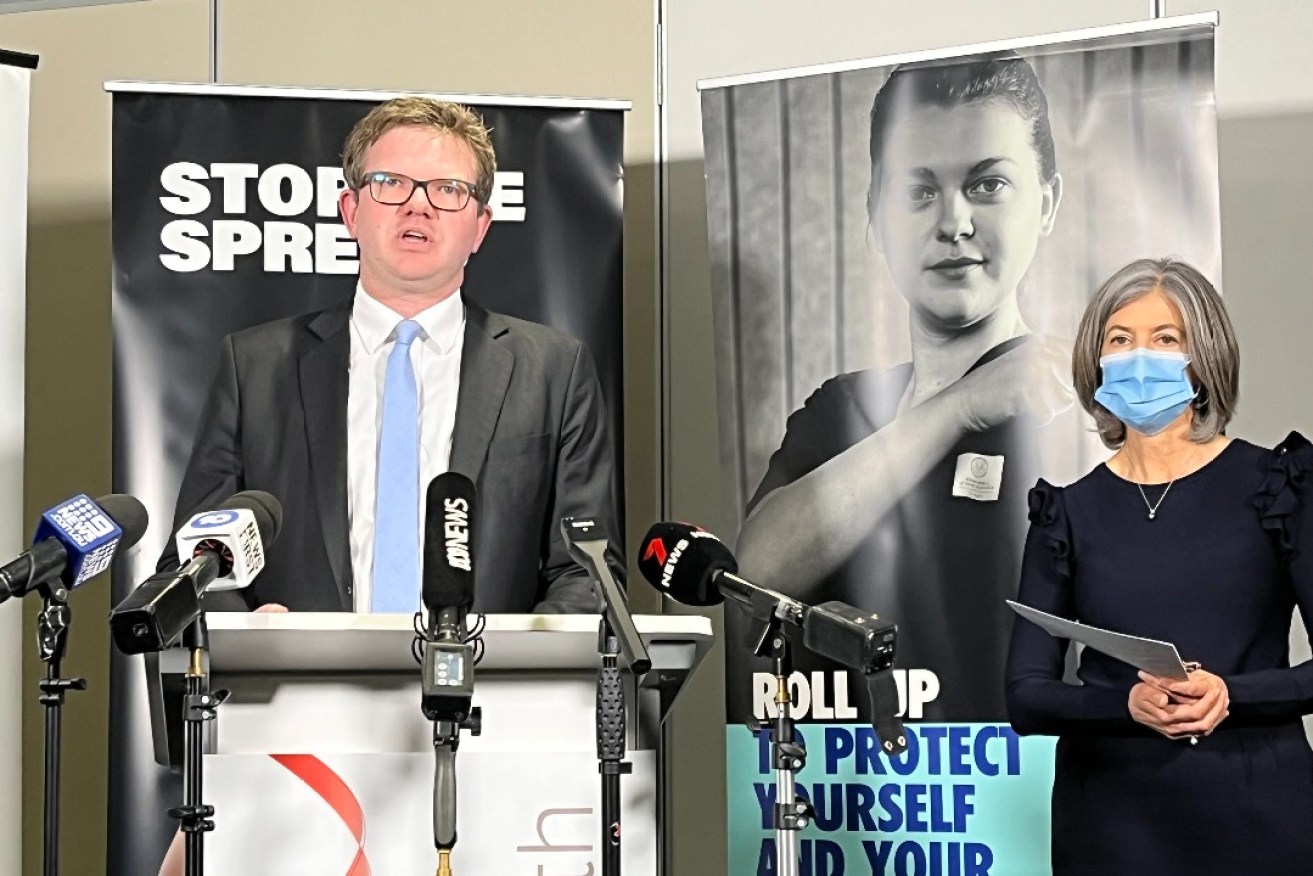‘Really dangerous’: Picton’s hospital warning ahead of COVID peak
South Australia’s overwhelmed hospital system will be hit with a surge in demand when a new COVID-19 wave hits, the Health Minister says, as modelling predicts up to 6000 daily cases by the end of this month.

Health Minister Chris Picton and chief public health officer Professor Nicola Spurrier. Photo: Stephanie Richards/InDaily
Updated University of Adelaide modelling released today forecasts the state is still on track to record between 5000 to 6000 daily COVID cases within three weeks’ time, spurred by the spread of a new Omicron variant, BA.5.
The modelling predicts the number of people admitted to hospital because of COVID will also rise from an estimated 75 patients currently, to about 150 patients by the end of July.
SA Health today reported 3141 new COVID cases – up from the 2559 infections recorded yesterday.
There are 234 patients with COVID currently in hospital, including those who have the virus but are hospitalised for other medical conditions.
“Clearly, we are facing a really dangerous situation in terms of our hospital situation and our health services because we clearly don’t have the capacity in our system,” Health Minister Chris Picton said.
“This is really difficult that our doctors, nurses, allied health professionals are working their guts out trying to provide care for their patients against what is a really difficult situation in terms of… COVID and flu cases.
“We are absolutely trying to open any additional capacity we can.”
Every Adelaide hospital emergency department was operating above capacity at the highest level “code white” last night, with the nurses’ union describing the health system as being “on the brink of collapse”.
SA Health has been scrambling to open additional beds in hospitals on the outskirts of Adelaide, as well as across the private health system, ahead of the looming BA.5 wave.
“We are now opening every possible bed across the health system to cope with the demand that we’re seeing,” Picton said.
“We are now refocussing our efforts to try to find any additional capacity that we can open in the health system based on clearly this modelling showing increasing numbers of cases.”
Chief public health officer Professor Nicola Spurrier said COVID case numbers had started to rise over the weekend, foreshadowing “quite a steep increase” over the coming weeks.
“Fortunately what goes up also comes down,” she said.
“As people know, the wave comes through and then it reduces again, but there’s a lot that we can do as South Australians to reduce the height of that curve.
“It is within our own personal power to do something about it.”
Spurrier urged people to consider wearing face-masks in indoor crowded places, including in supermarkets and shopping centres, as well as on public transport, where they are still mandatory.
But she stopped short of suggesting mask mandates should be reimposed in other places.
“I’m comfortable where things are at the moment,” she said.
“I think we’re comfortable as a community and I’m comfortable having provided advice.
“We can put all sorts of density restrictions in place and such like, but as a community, I think we’ve moved on from that.”
Picton said the government was not considering reintroducing mandates, but it was working out how it could ensure more people wore a mask while on public transport.
“I think the best approach that will be taken primarily in terms of public transport is one about educating and working with the community,” he said.
“That’s served South Australia very well so far and that’s likely to continue.”
SA calls on Commonwealth to ease antiviral eligibility
Both Picton and Spurrier called on the federal government to relax eligibility rules for antiviral medication for COVID-19, saying the current system prevents at-risk people from accessing the drugs.
The Pharmaceutical Benefits Scheme mostly limits antiviral drugs to older Australians, Aboriginal and Torres Strait Islander people with two other risk factors, and those who are moderately to severely immunocompromised.
The scheme’s advisory committee will reconsider the eligibility requirements later this week following a push by federal health minister Mark Butler.
Picton said he wanted the current “difficult, confusing, complicated set of criteria” changed to allow GPs to more easily prescribe antiviral medication to at-risk people.
“For instance, if you’re 74-years-old, you have to demonstrate that you have had two different chronic health conditions to be able to access antivirals, whereas clearly if you’re 74-years-old you are at a higher risk of getting severe complications from COVID-19,” he said.
“There are half of million… of the Pfizer antivirals in Australia already, but only about 20,000 have actually been used so far.
“Clearly there’s an issue here that we need to address.”
Spurrier said the current rules were “frustrating” for GPs, given Australia has “a good supply” of antiviral medication.
“It would be good to see more of that being used in the community because it is lifesaving,” she said.
Both Spurrier and Picton also said they supported moves by the Australian Technical Advisory Group on Immunisation (ATARGI) to consider whether to allow more people to get a fourth COVID-19 vaccination.
“I absolutely support consideration by ATARGI this week on increasing the eligibility for people to get access to the fourth dose – whether that’s bringing the age requirements down to 50 years old, or whether that’s making a rule in terms of anyone from six months since your third dose of being able to access it,” Picton said.




